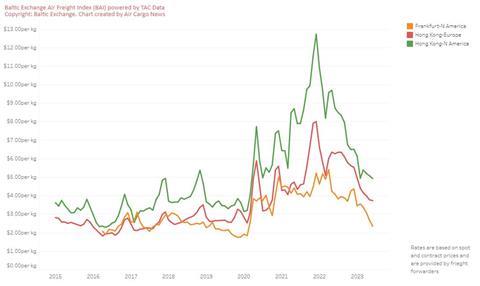
Airfreight rates declined again in June as the quieter summer period resulted in a demand slowdown (see dashboard at end of article).
The latest figures from the Baltic Exchange Airfreight Index (BAI) show that average rates – based on contract and spot process paid by forwarders – on services from Hong Kong to North America slipped to $4.92 per kg in June from $5.07 per kg in May. Compared with last year, rates are 43.6% down.
From Hong Kong to Europe, average rates were down from $3.77 per kg to $3.73 per kg and against a year earlier prices are down 40.4%.
The fall between May and June is typical for the year given that demand reduces during the summer period and capacity increases as bellyhold capacity is added for the summer season.
Prices tend to fall incrementally during the summer before starting to pick up again in September ahead of the summer peak season.
Meanwhile, the fall in rates compared with last year reflect weaker market conditions, although declines do now seem to have plateaued.
"Global air cargo tonnages in June show a continuation of the flat trend we have seen since the beginning of the month, while average rates remain on a slightly sliding trend," said WorldACD in its latest market summary.
"Comparing the overall global market with this time last year, chargeable weight in weeks 24 and 25 was down 6% compared with the equivalent period last year, mainly driven by decreases in tonnages ex-North America (-17%), ex-Europe (-9%) and ex-Asia (-3%).
"Increases were recorded ex-Africa (+5%), ex-Central & South America (+3%) and ex-Middle East & South Asia (+3%)."
Capacity for the period, meanwhile, was up 11% compared with last year, the data provider said.
TAC Index said that rates in the latter part of June had improved, helped partly by strong e-commerce business via southern China.
In a market outlook, Scan Global Logistics (SGL) said it expected the current quiet conditions to continue.
"We maintain a view that supply will exceed demand for the foreseeable future," said SGL. "Capacity supply will decrease slightly after the summer holiday period due to a decreased number of passenger flights; however, as stated earlier, not to an extent that will impact the overall supply and demand situation.
"A demand increase is likely to occur only if the macro and geo-political situation changes for the better.
"The decreasing inflation levels will have some form of positive impact, and, as cited earlier on, some analysts predict that the over-inventory slashing has been taken too far and thus could prompt a surge in airfreight demand. In other words, the limbo mode continues."
















